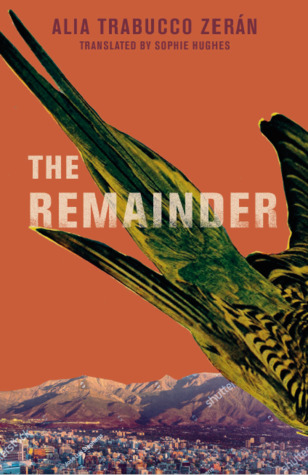
by by Margaret Kolb

Published by Coffee House Press, 2019 | 240 pages
In the field of mathematics, a problem that has yet to be solved is called an open problem. The Riemann hypothesis is perhaps the most famous open problem is mathematics. The twin prime conjecture is another. Open problems are, famously, the stuff of obsession, even madness. As Farkas Bolyai wrote in a 1820 letter to his son János, cautioning him not to work on a famous open problem of their day: "You should detest it just as much as lewd intercourse, it can deprive you of all your leisure, your health, your rest, and the whole happiness of your life. This abysmal darkness might perhaps devour a thousand towering Newtons, it will never be light on earth." Such is the place of open problems in the regard of mathematicians.
The central conceit of Alia Trabucco Zerán’s The Remainder is an open problem of sorts, though one of a very peculiar variety. The Remainder is a story about the aftermath of the Pinochet regime, and the transgenerational trauma that the children of Chile suffer as a consequence of Pinochet’s enforced disappearance of what is estimated to be 11,000 victims. Of the 11,000 people who have been officially registered as disappeared, only 104 have ever been found. The Remainder is, simply put, the story of main character Felipe's obsessive, disturbed quest to calculate the death toll of the wake of destruction around him. As Felipe ponders:
weekly or bimonthly corpses which I totted up methodically, and the tally rose like foamy scum, like rage and lava it rose, till I twigged that adding them up was the problem because it makes no sense for the number to rise when we all know the dead fall... Counting up is not the answer: how can I square the number of deaths and the number of graves? how will I work out how many are born and how many remain? how can I reconcile the death toll with the actual sum of the dead? by deducting, tearing apart, rending bodies.The disappeared are figuratively an open problem that can only be solved by “apocalyptic maths.”
Despite its heavy subject matter, at its heart The Remainder is a road trip novel that pays subtle homage to the template that Jack Kerouac established with On the Road. Much like On the Road, little happens in terms of plot in the novel. The three main characters are Iquela, a young Chilean woman and daughter of a militant who resisted the Pinochet regime; Paloma Aguirre, a German-Chilean who fled to Germany with her mother upon the fall of Pinochet’s dictatorship; and Felipe, Iquela’s cousin, whose parents were murdered by Pinochet. The inciting incident in the novel is the death of Paloma’s mother, Ingrid, and the attempt to repatriate her body to Chile. When the corpse is lost during transport, Felipe, Iquela and Ingrid must work together to find the body, despite their conflicted interest in recovering it. The novel is mostly a narration of the characters’ thoughts, feelings and reflections on the past that brought them to this harrowing road trip.
While Pinochet is never referred to by Zerán, it is obvious that the devastation he left is at the center of her characters’ lives. The story begins with Iquela’s memory of the first time she met Paloma, which happened to be the day of the 1988 Chilean national plebiscite that removed Pinochet from office and inaugurated Chile’s transition to democracy. The Pinochet regime was responsible for the torture of tens of thousands of prisoners, the exile of 200,000 Chileans, and the death and enforced disappearance of thousands of people. The novel unravels how it is that Iquela, Felipe and Paloma continue to suffer the consequences of the Pinochet’s actions, despite the fact that they were only children at the time. While the title, “The Remainder,” clearly refers to the inability to reconcile the difference between the disappeared and the dead bodies that can actually be found, it also refers to the traumatized children who remain as vestiges of this dark chapter in Chile’s history that they are not responsible for, and yet can never escape.
Zerán’s novel explains how trauma is transmitted across generations, and how it permeates societies, families and individuals. Zerán successfully represents how helpless the characters are in preventing what Freud described as trauma’s ability to cause “permanent disturbances of the manner in which the energy operates.” This disturbed energy, which is only further impaired by the characters’ reliance on alcohol, nicotine and other drugs (addiction is a typical consequence of trauma), fuels their road trip across the Andes.
While the subject matter of Zerán’s novel is bleak, there is no shortage of humor, both light and dark, and vicarious pleasures are to be had in this road trip novel. On the road, fast friendships with strangers are made, sex is had, and a lot Pisco is consumed. The greatest source of dark humor is the road trippers’ means of transport. While Kerouac immortalized Cassady’s ’49 Hudson in On The Road, Paloma, Iquela and Felipe could be said to do the same for “The General,” a hearse that they secure to facilitate the transport of Ingrid’s body, presuming they find it. One night the trio climb into the back of the hearse and luxuriate in the velvet lining of the trunk bed. In order to fit in a space that is meant for one dead body, they contort their bodies into a broken circle. Like children, they play the game of categories where a category is announced, and all are asked to come up with a word that begins with a certain letter. Of course, their chosen categories, “Ways of Killing or Dying” and “Cemeteries” reveal that these are deeply scarred young adults whose trauma has adaptively become a source of dark amusement.
The character portraits are, without exception, rich and compelling. Iquela, who plays the straight woman to Paloma’s wildness, is a version of Kerouac, and Paloma is akin to Neal Cassady. Even as a child, Iquela was inexplicably drawn to Paloma, who struck Iquela as something of a “rock star.” As an adult Iquela still finds herself irresistibly attracted to Paloma, a rebel who smokes incessantly, steals her now deceased mother’s cancer drugs for recreational purposes, and has a tongue piercing. Felipe, who has no analog, plays the third wheel. Though he is peripheral to the central plot, which is largely focused on the relationship between Iquela and Paloma, he narrates half of the novel’s chapters – the other half, which propel the actual plot of the novel, are narrated by Iquela – and his compulsive fixation suffuses the entire novel with macabre urgency. While Paloma is fixated on the missing corpse of her singular mother, Felipe plays her foil, fixated on the thousands of missing corpses. In the novel’s final explosive chapters, he proves to be willing to do the unthinkable to prevent her from solving her problem in order that he can make progress towards solving his own.
In real life, the families of the disappeared have repeatedly called out the Chilean government for its indifference, and at times interference, in the search for the missing bodies. It was only in April 2019 that Michelle Bachelet, former president of Chile (2006-2010;2014- 2018) and current UN High Commissioner for Human Rights, responded to the more than 40,000 reported enforced disappearances in Mexico by formally introducing for consideration a plan for the Implementation of the General Law on Disappearances, the re-establishment of a National Search System, and a plan to create a Single Information System and a National Institute for Forensic Identification. Whether these plans actually will be presented, and whether they will be realized, is unknown. In the face of so much uncertainty, and after decades of political apathy towards the fate of the disappeared, Zerán’s novel serves as a vital historical reckoning with Chile’s recent past and present. The Remainder, much like the phenomenon of trauma, problematizes the distinction between past and present, and cries out in its own unique way the urgency of healing.
Jeanette Tran is a scholar of early modern literature who also enjoys reading contemporary American fiction. She currently resides in Iowa.















click to see who
MAKE Magazine Publisher MAKE Literary Productions Managing Editor Chamandeep Bains Assistant Managing Editor and Web Editor Kenneth Guay Fiction Editor Kamilah Foreman Nonfiction Editor Jessica Anne Poetry Editor Joel Craig Intercambio Poetry Editor Daniel Borzutzky Intercambio Prose Editor Brenda Lozano Latin American Art Portfolio Editor Alejandro Almanza Pereda Reviews Editor Mark Molloy Portfolio Art Editor Sarah Kramer Creative Director Joshua Hauth, Hauthwares Webmaster Johnathan Crawford Proofreader/Copy Editor Sarah Kramer Associate Fiction Editors LC Fiore, Jim Kourlas, Kerstin Schaars Contributing Editors Kyle Beachy, Steffi Drewes, Katie Geha, Kathleen Rooney Social Media Coordinator Jennifer De Poorter
MAKE Literary Productions, NFP Co-directors, Sarah Dodson and Joel Craig